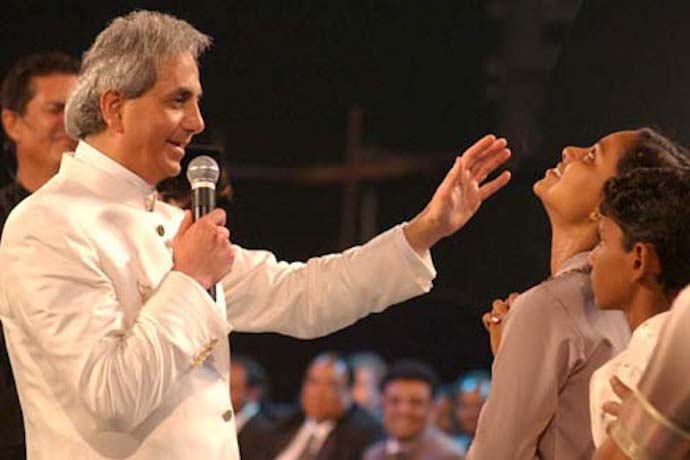When I was a freshman at the University of Minnesota in the 1990s, I was working out on a bench press at the gym when a fellow student came over and asked if he could help me with the heavier weights. I eagerly accepted.
As we worked our way up the weights (by now over 225 pounds), he asked me if I wanted to play football after. I agreed again. He immediately jumped to his next question: would I like to go to a non-denominational church service after the game? When I politely told him I was a Hindu and not interested, he left me—in mid-set—and walked away. The weights fell on my chest, and as I felt the oxygen leave my body, I turned the barbell enough to ask for help. A person nearby came over to help lift the weights off.
That memory resurfaced when I read Kamesh Sankaran’s “The Humbling of a Proud Hindu” in Christianity Today, which mixed a genuine spiritual journey with the idea that Christianity is superior to Hinduism. This sort of triumphalism among Christians—particularly converts—is nothing new, but it also hides the realities many Hindus living under Christian contexts face.
For example, in southern India, where Sankaran (and my parents) hails from, many poor Hindus couldn’t receive an education unless they converted to Christianity. The same applied to countries like Guyana, where my wife’s dad and others of his generation took Christian names for schooling purposes. It was based on the idea that one couldn’t get educated—or enlightened—unless they rejected their identities. Sankaran conveniently dances around the subject of forced or coerced conversion of Hindus and other non-proselytizing religious groups.
He goes on to explain how he was “re-introduced” to Jesus in the United States, thanks to the proselytizing of a colleague.
On a few occasions, the Cross of Christ came up in casual conversation. Sensing that I was missing something, my friend explained that Jesus Christ died bearing our sins to reconcile us to God.
The passage is all too familiar to many Hindus who get the question about missing something in their lives and the need to fill what’s missing through Jesus. I’ve experienced it. Comedian Hari Kondabolu even had a famous anecdote in his standup about being proselytized in London years ago. I’ve written here on RD about how Bobby Jindal was bullied into converting, and how he later spun it into an epiphany.
Sankaran goes on to explain that in order to commit to Jesus, he had to reject all that Hinduism offered:
The more I pondered these questions, the clearer it became that the answers offered by Hinduism and Christianity are utterly incompatible. I had to reject the former to receive the latter. Functionally, I had to rethink all of life from a clean slate because I simply did not have a framework or vocabulary to make sense of my new identity.
If that’s the case, it isn’t for Hinduism’s sake—Hinduism includes a theologically pluralistic approach to the Divine.
Sankaran also concludes his “humbling” journey with another whopper: “While Hinduism ties one’s religious standing to one’s birth status, Christianity teaches that the ground is level at the foot of the cross.” That claim is based on the false idea that Hinduism’s core tenets are based on caste. Sankaran conflates social practices in India—which are not limited to Hindus—with Hindu theology, which does not endorse a hierarchical view of humanity. One would have a far better case arguing that Christianity supports slavery than that Hinduism supports the caste system.
But what’s ultimately most depressing about Sankaran’s piece is that he writes as if his former life as a Hindu was all a lie, and that the only way to be humbled is to accept Jesus as the sole savior. The idea of Christian triumphalism is predicated upon a fundamental rejection of the idea that there are multiple paths to the Divine. It’s a shame that in his journey, Sankaran decided to reject tolerance and pluralism along the way.





